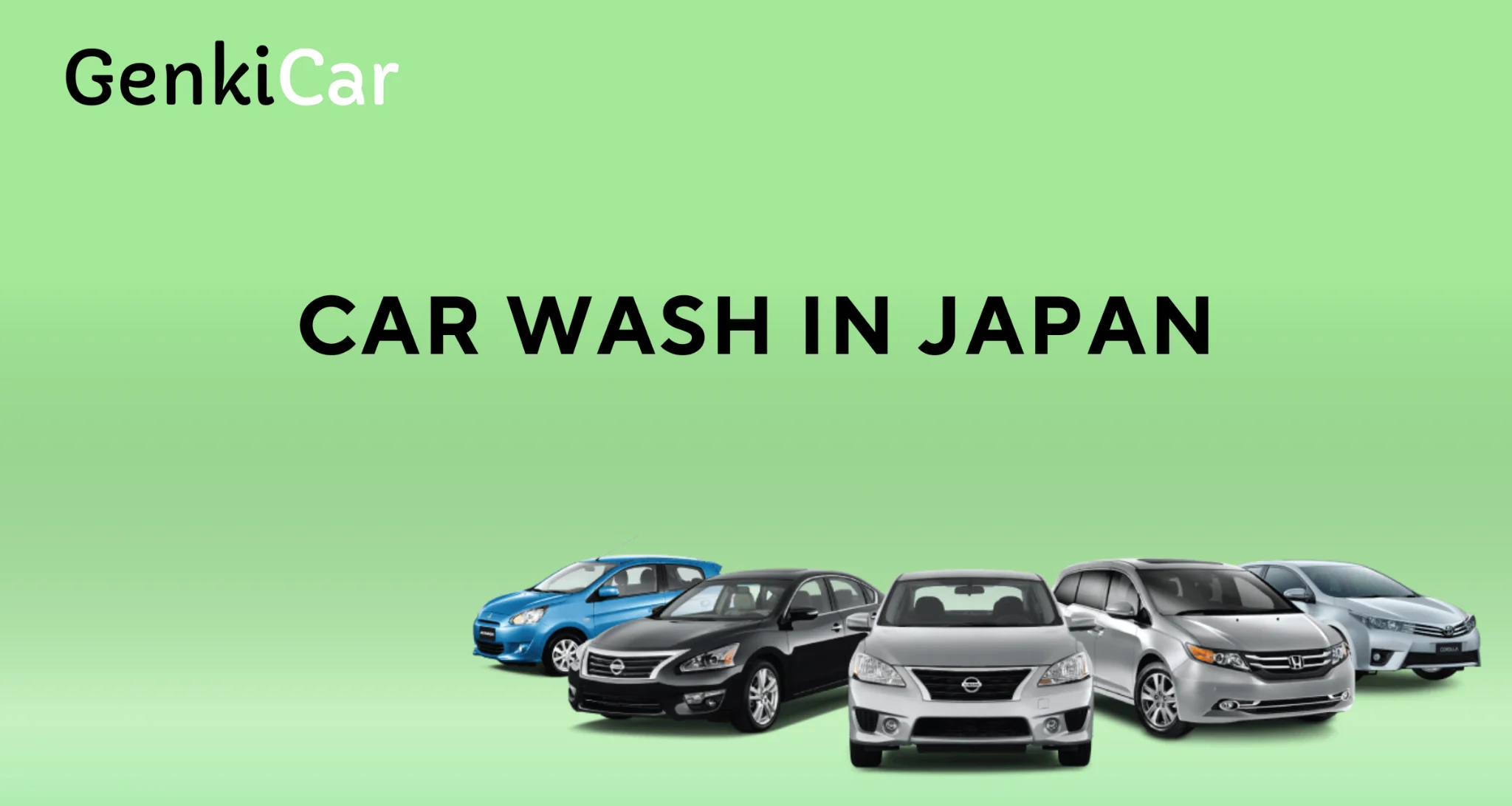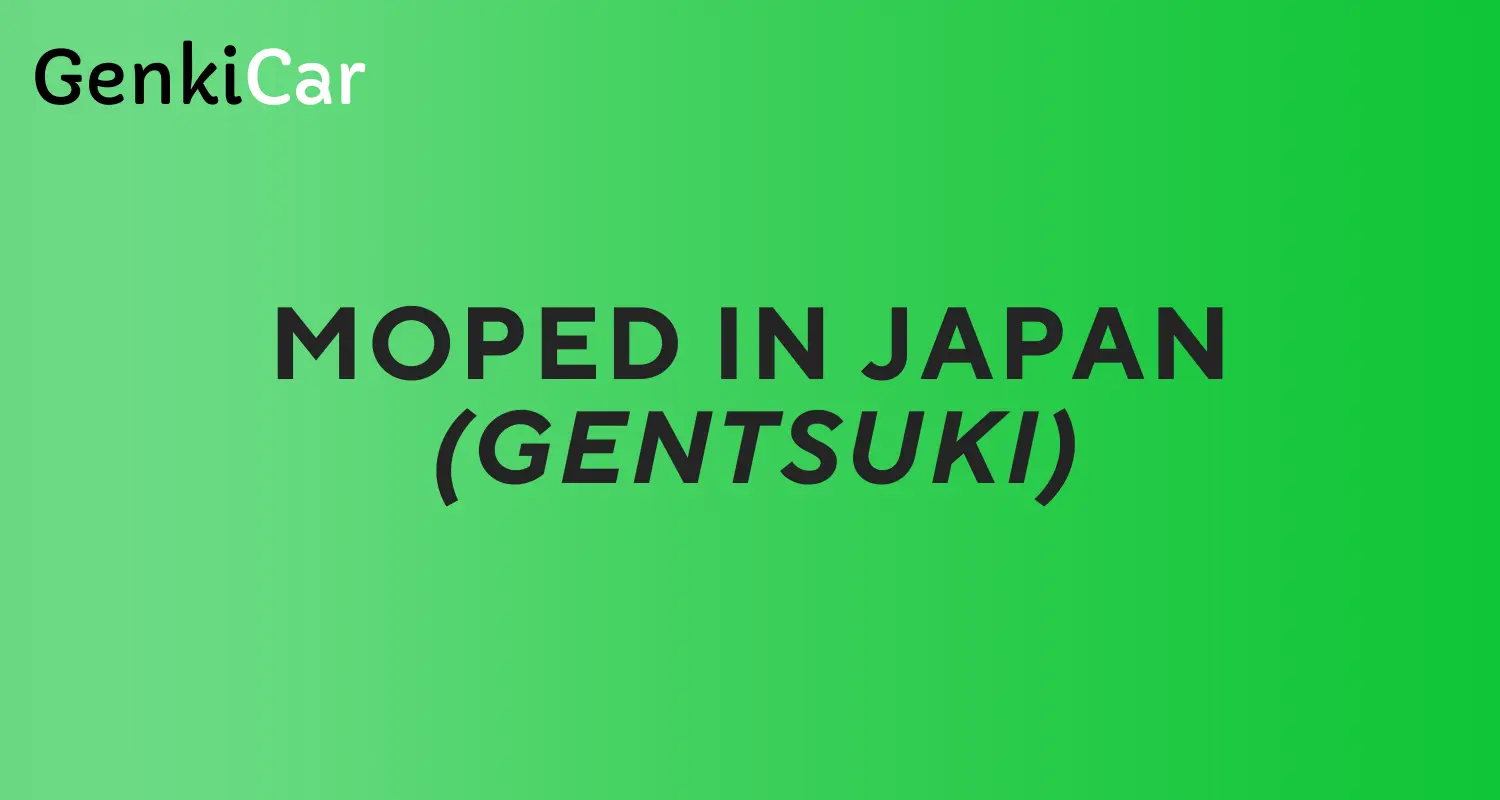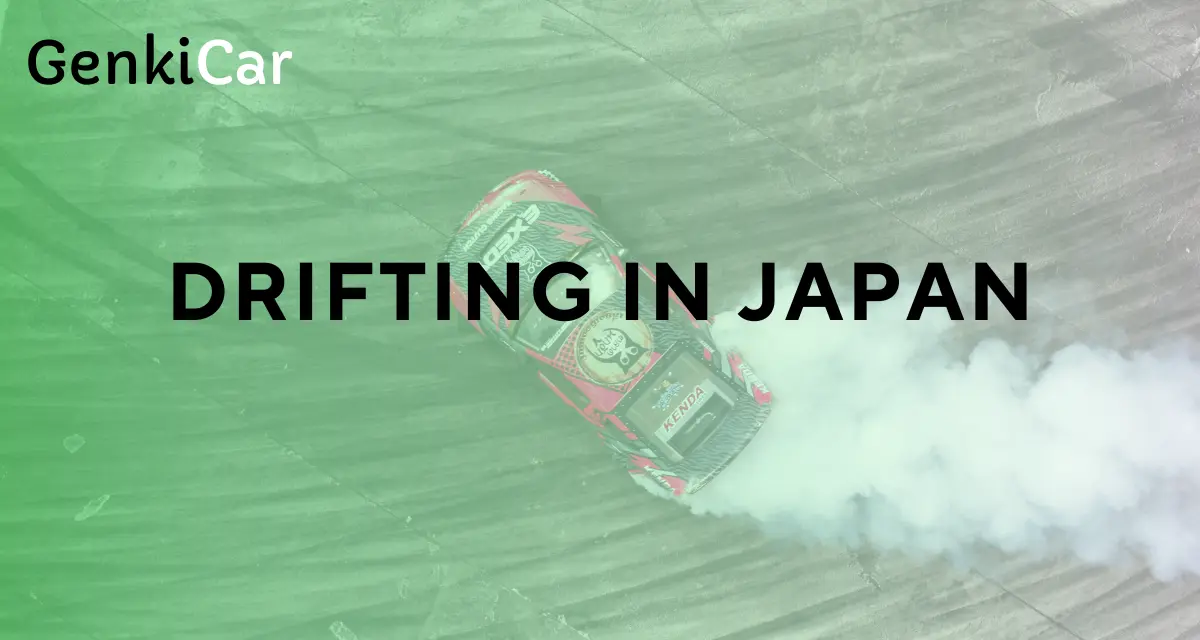In Japan, a clean car is often seen as a reflection of the owner’s respect for themselves and their community. This cultural kinda force drives many Japanese car owners to maintain their vehicles in good condition, making a car wash in Japan an important part of the driving routine.
And since Japan’s climate is very different, it significantly influences car washing habits. In regions with snowy winters, frequent washes are necessary to remove salt and grime that can lead to corrosion. During the humid summer months, pollen, dust, and insect residue can accumulate quickly, prompting more regular cleaning. Urban areas, with their higher levels of pollution, also see increased demand for car washes.
Top 5 Types of Car Wash in Japan
Automated Car Wash Stations
Automated car wash stations are a staple of convenience in Japan. Found primarily at gas stations, these systems provide quick and efficient cleaning for busy car owners. Drivers simply select a washing package, drive into the station, and let the machine handle the rest. Options typically range from basic rinses to premium washes that include waxing and undercarriage cleaning. The affordability (starting as low as ¥500) and widespread availability make these stations a popular choice, especially in big cities like Tokyo, Osaka, and Nagoya.
Self-Service Car Wash Facilities
For those who prefer a hands-on approach, self-service car wash facilities offer the tools needed to clean your car at your own pace. These facilities typically include high-pressure hoses, foam dispensers, and vacuums. Users can bring their own cleaning supplies or purchase them on-site. Self-service stations are ideal for car enthusiasts who want to ensure every nook and cranny is spotless. Costs vary, but sessions generally start around ¥600, making it an economical choice for detail-oriented drivers.
Full-Service Car Wash Centers
Full-service car wash centers cater to customers who value a comprehensive cleaning experience. At these locations, trained staff hand-wash vehicles, focusing on areas that automated systems might miss, such as intricate wheel designs or under the wipers. Many centers also offer add-on services like interior vacuuming, glass polishing, and waxing. Prices typically range from ¥2,000 to ¥20,000, depending on the services selected. While more expensive, these centers are favored by luxury car owners and those seeking professional-grade care.
Looking for a trusted dealership? Let us help! Get in touch for a list of top-rated, English-speaking dealers nearby.
Mobile and On-Demand Car Washes
Mobile car wash services are gaining traction in Japan. These services bring the car wash to you, whether at your home, office, or parking lot. Offering flexibility and convenience, mobile washers provide everything from basic rinses to full detailing. Prices generally start at ¥5,000 and can go up depending on the package and location. This option is particularly appealing to busy professionals or those living in areas with limited access to traditional car wash facilities.
Waterless Car Wash and Eco-Friendly Options
As environmental awareness grows, waterless car washes have become a popular alternative in Japan. These services use biodegradable cleaning solutions and specialized microfiber cloths to clean vehicles without water. In addition to conserving resources, waterless washes are ideal for urban areas where water restrictions or limited access to outdoor spaces can be an issue. Prices start at around ¥5,500, and the results often rival traditional methods in terms of shine and cleanliness.
Why is Eco-Friendly Car Wash in Japan Gaining Popularity?

Eco-friendly car washes, particularly waterless systems, are becoming increasingly popular in Japan due to their significant environmental advantages. Traditional car washes consume large amounts of water, up to 200 liters per wash, whereas waterless systems use biodegradable cleaning solutions and microfiber cloths to achieve similar results with minimal waste. These systems also reduce the risk of chemical runoff, which can pollute local waterways. For environmentally conscious car owners, waterless car washes offer a guilt-free way to maintain their cars without damaging natural resources.
Government Incentives for Sustainable Practices
The Japanese government has introduced various incentives to encourage eco-friendly practices across industries, including the car wash sector. Subsidies and tax breaks are available for businesses that adopt water-saving technologies or implement recycling systems to reduce their environmental footprint.
How Often Should You Wash Your Car in Japan?
Seasonal Considerations (Winter vs. Summer)
| Season | Frequency of Car Washes | Reasons |
| Winter | Weekly or after heavy snowfalls | Removal of road salt and prevention of corrosion due to snow and salt exposure. |
| Summer | Bi-weekly | Accumulation of dust, pollen, and insect residue that can damage paint if untreated. |
| Typhoon Season | Additional washes as needed | Removal of dirt and debris brought by strong winds and rain. |
Urban vs. Rural Frequency Trends
Car washing habits vary significantly between urban and rural Japan. In cities like Tokyo, where pollution levels are higher, cars are exposed to grime, soot, and bird droppings more frequently. As a result, city car owners tend to wash their cars at least every two weeks. In contrast, rural areas with cleaner air and less congestion see lower exposure to pollutants. Residents in these regions usually wash their cars less frequently, often timing cleanings after rainfall or when visible dirt accumulates.
Tips for Maintaining Your Car Between Washes
To keep your car looking pristine between washes, consider these practical tips:
- Use a Car Cover: Protect your vehicle from dust, bird droppings, and UV damage when parked outdoors.
- Quick Dusting: Keep a microfiber cloth handy to remove surface dust and light debris regularly.
- Spot Cleaning: Address small stains or spots immediately using waterless cleaning sprays or wipes to prevent long-term damage.
- Waxing: Apply a protective layer of wax every few months to repel dirt and water, reducing the need for frequent washes.
- Check Wheels and Undercarriage: Clean these areas periodically to prevent buildup of dirt and road salt, especially in winter.
What Are the Best Car Wash in Japan Apps and Memberships?
Actually, subscription-based car wash services are gaining popularity in Japan for their convenience and cost-effectiveness. These models allow car owners to pay a fixed monthly fee for unlimited or discounted washes, making regular maintenance more accessible. Examples include “Wash Pass” programs offered by major service stations and specialized chains like Keeper Pro Shop. Subscriptions usually come with tiered options, allowing you to choose basic plans for automated washes or premium plans that include hand washing and detailing.
Features of Car Wash Apps in Japan
- Real-Time Availability: Apps like “Times Car Wash” display the nearest car wash facilities with live updates on availability.
- Service Customization: Users can select specific wash packages, such as waxing, interior cleaning, or waterless washing, directly within the app.
- Cashless Payments: Many apps integrate cashless payment options, including credit cards and mobile payment systems like PayPay or Suica.
- Membership Management: Subscription holders can track their usage and manage renewals easily.
- Loyalty Rewards: Some apps offer points or discounts for frequent use, encouraging customer retention.
Pricing Comparison: Which Offers the Best Value?
| Payment Model | Cost | Features | Best For |
| Basic Subscriptions | ¥2,500–¥3,500/month | Unlimited automated washes. | Frequent washers who prefer cost-effective options. |
| Premium Memberships | ¥5,000–¥10,000/month | Includes hand washing, waxing, and detailing services. | Those seeking comprehensive car care. |
| Pay-As-You-Go Options | Starting at ¥500 per wash | Flexible, pay-per-use services via apps like “Eneos Dr. Drive” for occasional washes. | Infrequent or occasional washers. |
Value for Money: Users who wash their cars frequently benefit most from subscription models, while occasional washers might find pay-per-use options more cost-effective.
What Should You Know Before Using a Car Wash in Japan?
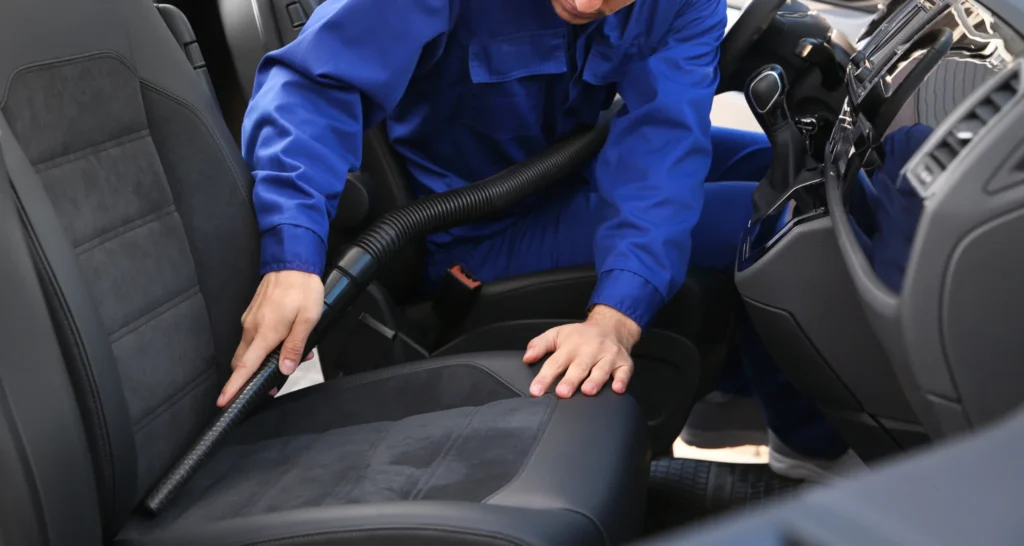
If you plan to use a self-service car wash in Japan, knowing a few key phrases can make the process smoother:
- 洗車 (Sensha): Car wash
- 高圧洗浄 (Kouatsu Senjou): High-pressure washing
- 泡洗浄 (Awa Senjou): Foam washing
- すすぎ (Susugi): Rinse
- 掃除機 (Soujiki): Vacuum cleaner
- 終了 (Shuuryou): Finish
Having these phrases in mind will help you deal with the instructions and signage at self-service stations with some confidence.
Automated Car Washes: A Step-by-Step Guide
- Choose Your Package: Use the kiosk or touchscreen to select your desired wash package. Options often range from basic rinses to premium wax coatings.
- Make Payment: Most systems accept cash, credit cards, or mobile payments like PayPay or Suica.
- Prepare Your Vehicle: Ensure your windows are fully closed, antennas are retracted, and mirrors are folded to avoid damage.
- Position Your Car: Drive into the designated area, aligning your wheels with the guide rails. Sensors will detect when your car is properly positioned.
- Sit Tight: Remain inside your car while the machine completes the washing process unless they say otherwise.
- Dry Your Car: If the package doesn’t include drying, many facilities provide drying areas equipped with microfiber towels or air dryers, for free.
You can also learn more about how ETC Cards in Japan can make your driving experience in Japan smoother and more efficient.
Avoiding Common Mistakes When Having a Car Wash in Japan
| Mistake | Description |
| Skipping Pre-Rinse | Not rinsing off loose dirt before applying soap can scratch the paint. |
| Using the Wrong Products | Harsh or abrasive cleaners not designed for cars can damage the car’s finish. |
| Leaving Water Spots | Not drying the car thoroughly leads to unsightly water spots, especially on darker vehicles. |
| Ignoring Undercarriage Cleaning | Road salt buildup in snowy regions can cause corrosion if not cleaned. |
| Neglecting Maintenance Between Washes | Bird droppings, sap, and debris can cause permanent paint damage if not removed. |
Top 3 Car Wash Chains in Japan
Wash Plus: Fast and Reliable
Wash Plus is one of the most popular car wash chains in Japan, with locations across major cities, it caters to busy car owners who need a quick yet thorough cleaning. Wash Plus offers automated wash options with premium add-ons like waxing and undercarriage cleaning. For those short on time, their express services can clean and dry a car in as little as 10 minutes. Additionally, the chain emphasizes eco-friendly practices, using water recycling systems to minimize environmental impact. Prices typically start at ¥500 for a very basic wash, making it a budget-friendly option.
Soft99: For DIY
Soft99 stands out as a go-to brand for car owners who prefer to take a hands-on approach to car care. While primarily known for its extensive range of car care products, such as waxes, polishes, and microfiber towels, Soft99 also partners with car wash facilities that incorporate their premium products. These locations often include self-service bays equipped with high-quality Soft99 cleaning solutions. The chain appeals to people who want to ensure every detail of their car is spotless while using trusted products. Soft99 also provides helpful tutorials and demonstrations, empowering car owners to achieve professional-grade results on their own.
YellowHat: Comprehensive Services Under One Roof
Yellow Hat is a well-established chain offering more than just car washes. It’s a one-stop shop for automotive care. In addition to hand wash and automated wash services, Yellow Hat provides detailing, tire checks, oil changes, and vehicle accessories. Their car wash packages range from basic exterior cleaning to full detailing, which includes waxing, interior vacuuming, and glass polishing. Yellow Hat is particularly popular among families and long-term car owners who want convenience and reliability in one place. Pricing starts at around ¥1,000 for basic services, with premium packages costing up to ¥10,000.
Is Mobile Car Wash in Japan Worth It?
In my opinion, mobile car wash services offer unparalleled convenience, especially if you are busy individual or living in Tokyo area where traditional car wash facilities may be hard to access. With door-to-door services, your car is cleaned at your home, office, or parking spot, no need for travel or waiting in line. Typically provide a range of options, from basic washes to full detailing, for a personalized experience. Mobile services also save time and are particularly useful for individuals with tight schedules or multiple vehicles requiring cleaning.
Pricing and Availability in Urban Areas
In areas like Tokyo, Osaka, and Nagoya, mobile car wash services are becoming increasingly popular and accessible. Prices generally start at around ¥3,000 for basic cleaning and can go up to ¥15,000/20,000 for premium detailing packages. While these prices are higher than automated or self-service washes, the convenience and quality of service often justify the cost. Availability varies by neighborhood, with more options in densely populated areas. Many mobile services also offer online booking and payment options.
Top On-Demand Car Wash Apps in Japan
INSTAWASH is the most popular and is a premium mobile car wash service designed for busy car owners. You can book a car wash at your home, office, or even a coin-operated parking lot through the app. Their waterless washing method ensures a spotless and scratch-free finish using specialized agents and microfiber towels. They claim that all services are performed by certified professionals to guarantee top-notch results.
Final Tips for Keeping Your Car Clean in Japan
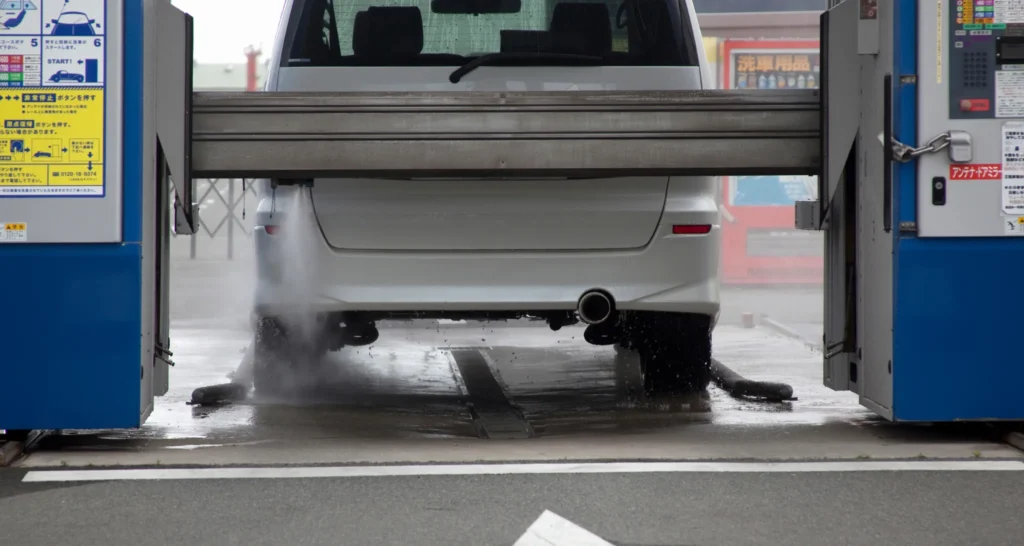
DIY Cleaning Supplies You Can Buy Locally
Japan offers a wide range of high-quality car cleaning supplies that cater to DIY enthusiasts. Some popular and widely available products include:
- Microfiber Cloths: Found in stores like Autobacs and Yellow Hat, these are essential for streak-free drying and polishing.
- Foam Sprays: Brands like Soft99 provide effective foam cleaners that lift dirt without damaging paint.
- Wax and Sealants: Easy-to-use spray waxes and long-lasting sealants are readily available for paint protection.
- Wheel Cleaners: Specialized solutions help remove grime and brake dust from wheels.
- Interior Cleaners: Multi-purpose sprays and detailing wipes are perfect for maintaining dashboards, upholstery, and glass surfaces. Local convenience stores and supermarkets often carry these supplies, making it easy to keep your car clean on a budget.
Best Practices for Protecting Your Car’s Paint
Protecting your car’s paint is essential for maintaining its appearance and resale value. Follow these best practices:
- Regular Waxing: Apply a layer of wax every 2–3 months to create a protective barrier against dirt, UV rays, and pollutants.
- Avoid Harsh Brushes: Use soft sponges or microfiber mitts to prevent scratches during cleaning.
- Rinse Thoroughly: Always rinse off loose dirt before scrubbing to minimize abrasion.
- Park Strategically: Whenever possible, park in covered areas to shield your car from the elements, including sun, rain, and bird droppings.
For more tips on keeping your car in excellent condition, visit our Ultimate Guide to Car Maintenance in Japan.
Why Regular Washing is Crucial in Japan’s Climate
Japan’s varied climate makes regular car washing essential to prevent long-term damage. In snowy regions, road salt used to melt ice can corrode your car’s undercarriage if not washed off promptly. During humid summers, pollen, dust, and insect residue can accumulate, dulling the paint and creating stains. Typhoons and heavy rain can leave behind grime and debris, necessitating immediate cleaning to maintain your car’s condition. You should be washing your car regularly, ideally every 1–2 weeks, you can then protect it from these environmental challenges and have it stay in top shape.
Frequently Asked Questions About Car Washes in Japan
1. How much does a car wash typically cost in Japan?
The cost of a car wash in Japan varies based on the type of service. Automated washes start at around ¥500, self-service stations cost between ¥600–¥1,000, and full-service car washes can range from ¥2,000–¥10,000. Mobile or premium detailing services may cost ¥3,000–¥15,000, depending on the package.
2. Are there eco-friendly car wash options available in Japan?
Yes, eco-friendly options like waterless car washes and facilities with recycled water systems are increasingly popular. These services use biodegradable cleaning products and minimize water waste, making them ideal for environmentally conscious car owners.
3. Can I find self-service car wash facilities in Japan?
Self-service car wash facilities exist but are less common in central urban areas like Tokyo. They are more widely available in suburban and rural regions. These facilities provide high-pressure hoses, foam dispensers, and vacuums for a hands-on cleaning experience.
4. Is it okay to wash my car at home in Japan?
Washing your car at home is generally acceptable if you have a private driveway or designated parking area with access to water. However, some urban areas discourage washing cars in public or residential streets due to drainage and environmental concerns.
5. How often should I wash my car in Japan?
Frequency depends on your location and the season. In snowy regions, weekly washes are recommended to remove road salt. In humid summers or urban areas, washing every 1–2 weeks is ideal to remove dust, pollen, and pollutants.
6. What’s the best car wash option for luxury vehicles in Japan?
For luxury cars, full-service car washes or detailing shops like Keeper Pro Shop are the best options. These services provide meticulous hand washing, waxing, and interior detailing to ensure premium care for high-end vehicles.
7. Are there mobile car wash services in Japan?
Yes, mobile car wash services are becoming more popular, especially in urban areas. They offer door-to-door convenience, bringing professional cleaning to your home, office, or parking spot. Prices start at around ¥3,000 for basic services.
8. What should I know before using an automated car wash in Japan?
Before entering an automated car wash, ensure your windows are fully closed, antennas are retracted, and mirrors are folded. Follow the on-screen or printed instructions carefully to position your car correctly and select your desired wash package.
9. Are there any loyalty programs or subscriptions for car washes in Japan?
Yes, many car wash chains, like Eneos and Wash Plus, offer subscription-based models. These plans provide unlimited washes or discounted rates for a fixed monthly fee, typically ranging from ¥2,500–¥10,000, depending on the service tier.
10. How can I protect my car’s paint in Japan’s climate?
Regular waxing, avoiding harsh brushes, and washing your car frequently are key to protecting its paint. Seasonal challenges like road salt in winter and pollen in summer can damage the exterior, so proactive care is essential.

